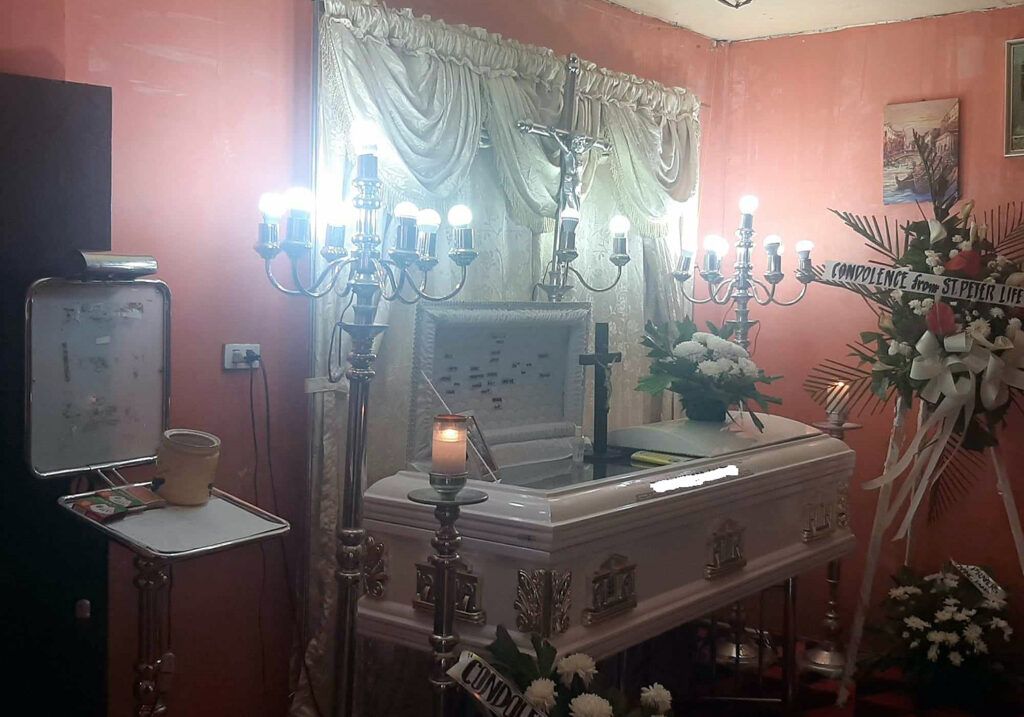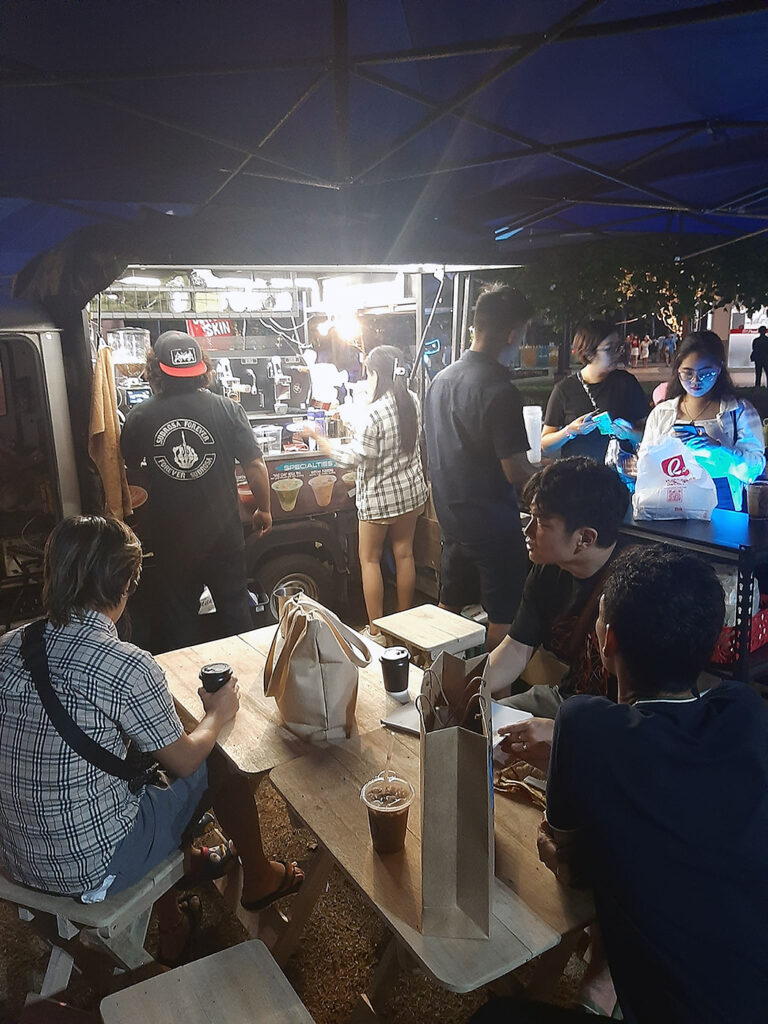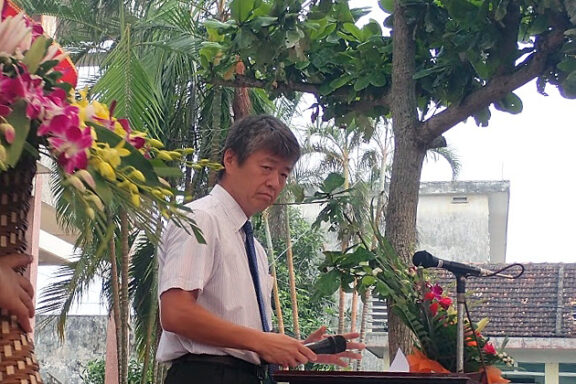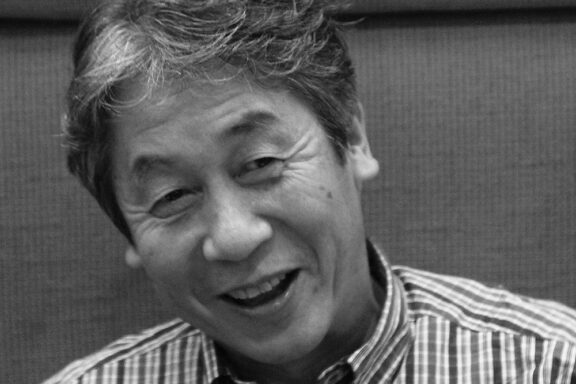Kisho Tsuchiya (Southeast Asian Area Studies, Modern History)
On October 30, I received news from my in-laws that my Filipino nephew had been stabbed to death in Puerto, Cagayan de Oro City. We hastily took an eight-hour bus ride from Davao to attend his funeral. According to the person who was with my nephew on the day of the incident, the two had gone to resolve some trouble related to a drug transaction, whereupon my nephew was stabbed by drug dealers. He died on the way to the hospital agreeing that “revenge should not be taken.”
In conversations with acquaintances afterward, I realized there was a huge gap between Japan and Mindanao in the perceptions of the murder. In Japan, someone asked me, “How can you accept such a crazy case, a misfortune that only falls upon one in a million, as just a part of everyday life?” Yes, my relatives in Cagayan de Oro and I were shocked by the murder and the loss of a family member. But we accepted it. We held a funeral just as we would for someone who died a natural death. There were no interviews by TV reporters. Between the services, we watched NBA games and “liked” posts on social media by our relatives in foreign countries. How can we explain this gap in perception? By investigating this, we might begin to understand the community of those involved.

Perception begins with experience. First is the experience of living in spaces where there is nearly no state control. In Mindanao and East Timor, where I have done fieldwork, many people take pride in not relying on the state. In environments where the state does not have a monopoly on violence, the primary method of maintaining order is revenge. Hence, my nephew’s last words. Yet today, there are people who wish to stop this practice of revenge.
Second is the experience of living in a society permeated with illegal drugs. Since the 1990s, the Philippines has consistently had one of the highest rates of drug use in Southeast and East Asia.[1] In Cagayan de Oro, drugs are easily available, and drug-related murders, rapes, and thefts are commonplace. My nephew’s death was not “a misfortune that only falls upon one in million,” but rather a familiar occurrence. Indeed, this was not my first time losing an acquaintance to a drug-related incident. For addicts among the poor, dealing drugs is the most stable way to obtain drugs; they may also turn to theft, sex work, or become street children. “Drugs come, public safety deteriorates, and families are destroyed” is an often-heard refrain from older people in Mindanao.

Even in Davao City, which prides itself on being “the most peaceful city in the Philippines,” the drug problem is a significant challenge. According to a social survey conducted by Ateneo de Davao University in 2023, about 73% of Davao citizens responded that they “know someone who uses drugs in their community.” When asked, “How do you define peace and order?” the most common responses were “no violent incidents” (57.6%), “no gangs or delinquents” (47.5%), and “no terrorism” (34.6%). However, the highest number of respondents (67.9%) identified “the absence of illegal drugs and their trade”[2] as the definition of peace and order, demonstrating that drugs are considered the most significant security risk. This background may be difficult to understand for people living in societies with low drug usage.
The mass media and research has tended to report and analyze the “war on drugs” initiated by former President Duterte solely as a human rights violation, without considering how the local experience of illegal drug use and its impact on everyday security has changed perceptions of peace and order. To some extent, I am troubled by this approach. Human rights has been a central concept used by the transnational social justice movements since the late 1970s to help define persecution by governments against their own citizens.[3] However, when the majority of the general public and state power align to justify extrajudicial violence, can human rights fully explain the causes, context, and dynamics of the mass psychology? Do we need further investigative approaches?

Failing to understand the changing sentiments of the Filipino public and assuming from the start that the “war on drugs” is an evil human rights violation echoes a classic debate among pioneers of area studies. In his critique of Herbert Feith’s The Decline of Constitutional Democracy in Indonesia (1962), Harry Benda notes that Feith is “presenting us highly sophisticated and persuasive answers to an intrinsically mistaken, or irrelevant, question.”[4] Benda writes that by beginning with the research questions of “Why did parliamentary democracy decline? and What is wrong with Indonesia?” Feith categorizes characters as good or bad based on an external perspective, thus distancing his readers from understanding the history and political thought of Indonesians.
Similarly, to understand the strong mass support for former President Rodrigo Duterte’s policies in the Philippine context, it is necessary to empathize with the current realities of Filipinos, to re-question what is important to them, and to delve into past experiences that they may be reluctant to touch. (to be continued)
Notes
[1] United Nations Office of Drugs and Crime. “Prevalence of Drug Use in the General Population – National Data.” 2007–2022. https://www.unodc.org/unodc/en/data-and-analysis/wdr2022_annex.html
[2] Christine S. Diaz, Cleofe A. Arib, and Mary Donna J. Cuenca. 2023. “City Wide Social Survey – Series 14.” Ateneo de Davao University. July 12.
[3] Samuel Moyn. 2010. The Last Utopia: Human-Rights in History. Cambridge, Mass: Belknap Press of Harvard University Press.
[4] Harry Benda. 1964. “Review: Democracy in Indonesia.” Journal of Asian Studies 23, no. 3: 449–456. doi: https://doi.org/10.2307/2050765
This article is also available in Japanese. >>
「〈ダバオ滞在記1〉リヴァイアサンのいない場所:
ある死を通して認識のギャップを問う」 (土屋喜生)





